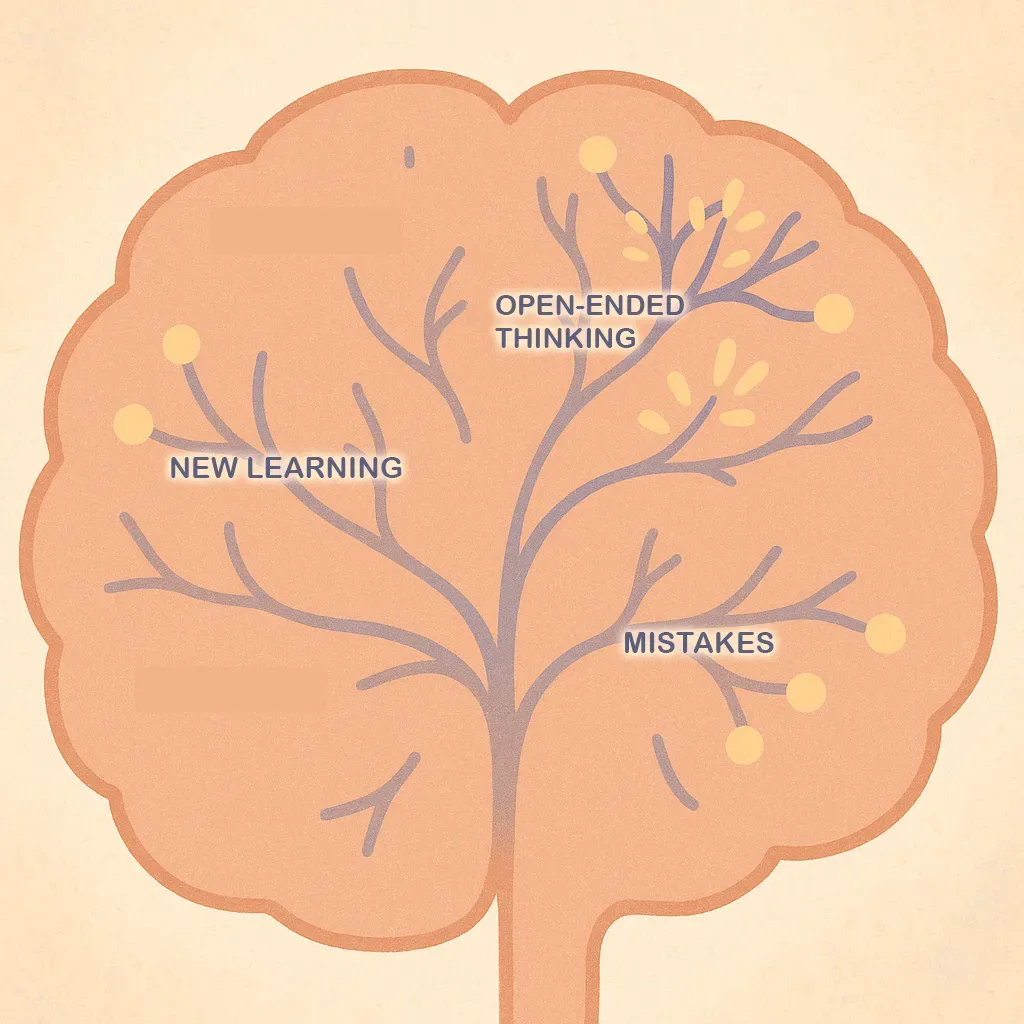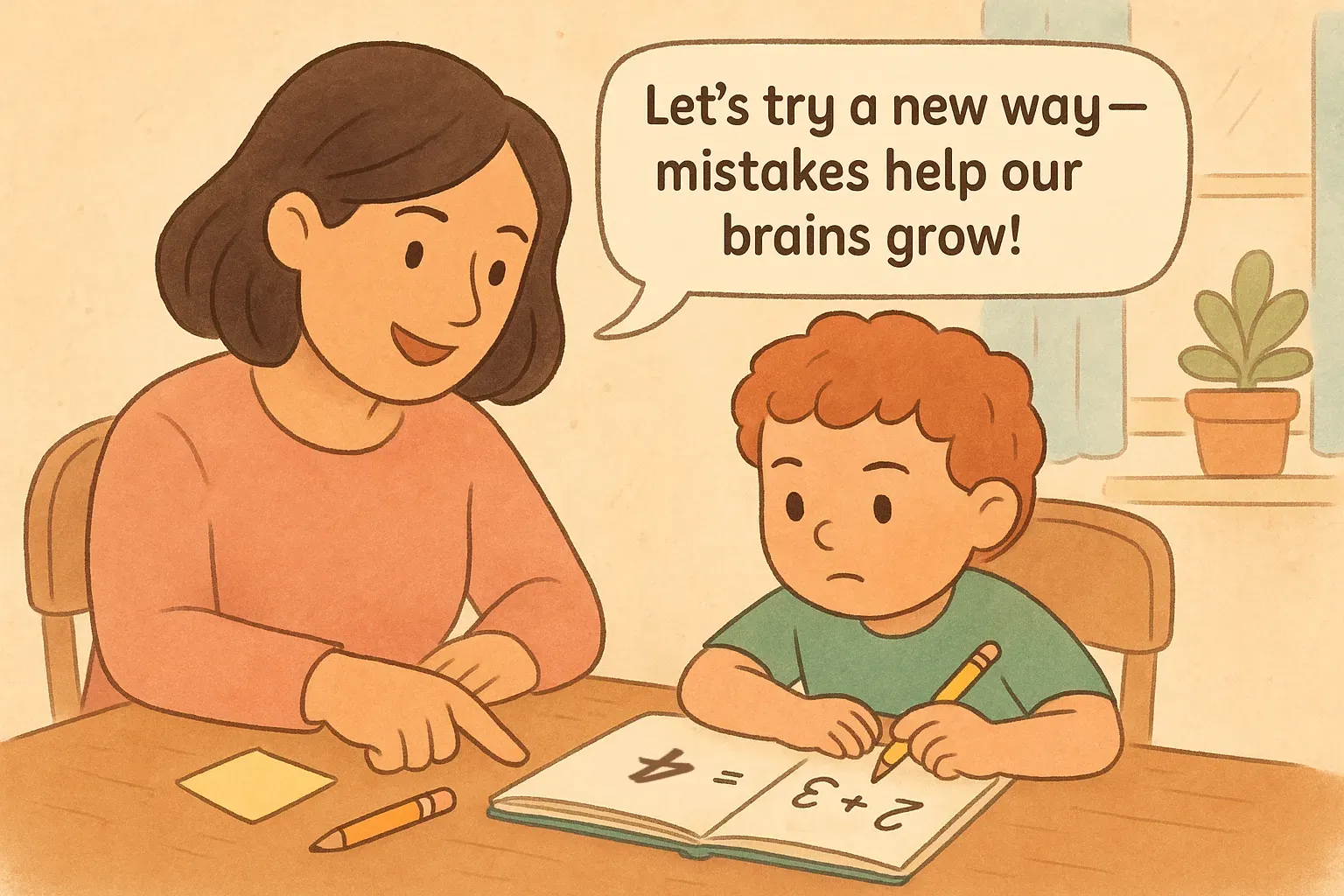Growth-Mindset Math: 7 Scripts Parents Can Use Tonight to Boost Confidence
TL;DR
Fostering a growth mindset in math can help children, especially those with ADHD or other neurodivergence, build confidence and resilience. Here are seven scripts parents can use:
- Teach about brain growth: "Every time you learn, your brain grows stronger!"
- Embrace mistakes: "Mistakes are how we learn. Let's see what we can learn from this."
- Encourage exploration: "Can you find another way to solve this problem?"
- Focus on understanding: "Take your time; it's about understanding, not speed."
- Model positivity: "I love learning new things in math too!"
- Praise effort: "I'm proud of how hard you worked on that."
- Use "yet": "You might not get it yet, but you will with practice."
Introduction
Many kids, when faced with difficulties while learning something new, tend to give up. Worse they can form opinions about themselves such as "they are bad at Math". Especially for kids with ADHD who can find Math difficult and also have to deal with focus related challenges, the negative mindset can become self-reinforcing.
However, by fostering a growth mindset, parents can help their children see math as a skill they can develop through effort and perseverance. A growth mindset, pioneered by psychologist Carol Dweck, is the belief that abilities can be cultivated through dedication and hard work. This approach is especially powerful for children with ADHD, who may benefit from strategies that reduce frustration and build confidence.
In this blog post, we share seven practical, research-backed scripts that parents can use tonight to encourage a growth mindset in their children aged 5-10, whether they have ADHD or not. These scripts are simple, parent-friendly, and designed to make math a positive experience.
Understanding the Growth Mindset
A growth mindset contrasts with a fixed mindset, where children believe their abilities, like being "good at math," are innate and unchangeable. According to Carol Dweck, a growth mindset encourages children to embrace challenges, persist through setbacks, and see effort as the path to mastery. This mindset is particularly beneficial for children with ADHD, who may face frequent negative feedback in academic settings due to difficulties with attention and executive functioning. By shifting the focus from innate talent to effort, parents can help their children develop resilience and a love for learning math.
Seven Scripts to Foster a Growth Mindset in Math
Below are seven scripts parents can use to encourage a growth mindset in math. Each script is backed by research and designed to be easy to implement during homework, math games, or casual conversations.
Script 1: Teach Kids About the Brain’s Ability to Grow

Explaining neuroplasticity - the brain’s ability to form new connections through learning - helps children understand that their math skills can improve with practice. This knowledge can be empowering, especially for children with ADHD who may feel discouraged by past struggles.
Example Script: "Did you know that every time you learn something new, like math, your brain grows new connections? It's like exercising a muscle; the more you use it, the stronger it gets!"
Research Support: A meta-analysis found that teaching children about neuroplasticity positively impacts motivation, achievement, and brain activity, particularly for at-risk students in mathematics - ref: Neuroplasticity Meta-Analysis.
Script 2: Model and Praise Mistakes as Opportunities for Brain Growth
Mistakes are a natural part of learning. By modeling a positive attitude toward errors and praising children for learning from them, parents can reduce fear of failure and encourage persistence.
Example Script: "I made a mistake here, but that's okay! Mistakes help us learn. Let's see what we can learn from this."
Research Support: Carol Dweck’s research shows that students with a growth mindset view failure as a chance to learn, leading to better performance and resilience - ref: Mindset Book.

Script 3: Provide Rich, Open-Ended Math Tasks
Open-ended math tasks encourage creativity and critical thinking, reducing the pressure to find a single "right" answer. This approach can engage children with ADHD by making math more interactive and less intimidating.
Example Script: "Instead of just solving this problem, can you think of another way to approach it? Or can you create your own math problem?"
Research Support: Inquiry-based learning in math education enhances students’ understanding and engagement with mathematical concepts ref: Inquiry-Based Learning.
Script 4: Remove an Emphasis on Speed
Timed tests can increase math anxiety, particularly for children with ADHD who may need more time to process information. Focusing on understanding rather than speed helps children engage deeply with math.
Example Script: "It's not about who finishes first, but about understanding the problem. Take your time to think it through."
Research Support: Jo Boaler argues that timed tests can cause math anxiety and hinder learning, advocating for a focus on conceptual understanding - Timed Tests Anxiety.
Script 5: Be Mindful of Your Own Attitude Towards Math
Parents’ attitudes toward math significantly influence their children’s perceptions. By modeling enthusiasm and curiosity, parents can inspire a positive outlook on math.
Example Script: "Math can be challenging, but it's also really rewarding when you figure something out. I love learning new things in math too."
Research Support: Studies show that parental attitudes and beliefs about math directly impact children’s math achievement and attitudes - Parental Attitudes.
Script 6: Praise the Effort, Not the Outcome or Ability
Praising effort rather than innate ability encourages children to value the learning process, fostering a growth mindset and reducing pressure to perform perfectly.
Example Script: "I saw how hard you worked on that problem. Your persistence paid off!"
Research Support: Dweck’s research demonstrates that praising effort leads to a growth mindset, while praising ability can foster a fixed mindset Mindset Book.
Script 7: Replace Failing with Learning, Using "Yet"
Using the word "yet" transforms statements of limitation into opportunities for growth, emphasizing that current struggles are temporary with practice.
Example Script: "You might not be able to do it yet, but with practice, you'll get there."
Research Support: Dweck’s work highlights the power of "yet" in shifting mindsets from fixed to growth, encouraging persistence - Mindset Book.
How to Implement These Scripts
To make these scripts effective, use them consistently during math-related activities, such as homework, puzzles, or educational apps. For children with ADHD, keep sessions short and engaging, using hands-on tools like blocks or digital games to maintain interest. Be patient, as changing mindsets takes time, and celebrate small successes to build confidence. Tailor the scripts to your child’s age and needs - for example, younger children may respond better to playful language, while older children may appreciate discussions about brain growth.
Neurodivergent Math Learning: Strategies That Actually Work
Examples in Action
Here’s how you might use these scripts in real-life scenarios:
Scenario | Script Used | How to Apply |
|---|---|---|
Child struggles with a math problem and says, "I’m bad at math." | Use "yet": "You might not get it yet, but you will with practice." | Encourage them to try again, perhaps using a visual aid like a number line, and praise their effort afterward. |
Child makes a mistake and gets frustrated. | Embrace mistakes: "Mistakes are how we learn. Let’s see what we can learn from this." | Work together to analyze the mistake, turning it into a learning opportunity. |
Child rushes through homework to finish quickly. | Focus on understanding: "Take your time; it’s about understanding, not speed." | Suggest they explain their reasoning for one problem to deepen comprehension. |
FAQ
Q: What if my child is really struggling with math despite using these scripts?
A: Be patient and consistent, as developing a growth mindset takes time. Consider consulting teachers or specialists for tailored strategies, especially for children with ADHD who may need additional support.
Q: How can I tell if my child has a fixed mindset?
A: Look for signs like saying "I’m bad at math," avoiding challenges, giving up quickly, or feeling threatened by others’ success. These scripts can help shift their perspective over time.
Q: Are these scripts only for children with ADHD?
A: No, they benefit all children aged 5-10. However, they’re particularly helpful for those with ADHD, who may need extra encouragement to build confidence in math.
Q: Where can I find more resources on growth mindset?
A: Explore Carol Dweck’s book Mindset: The New Psychology of Success, or visit websites like Mindset Works or YouCubed for additional tools and activities.
Conclusion
Fostering a growth mindset in math can transform how children, including those with ADHD, approach learning. These seven scripts offer a practical starting point for parents to encourage resilience, confidence, and a love for math. By using these strategies consistently and adapting them to your child’s needs, you can help them climb the math ladder with enthusiasm and perseverance.
References
- Sarrasin, J. B., Nenciovici, L., Foisy, L.-M. B., Allaire-Duquette, G., Riopel, M., & Masson, S. (2018). Effects of teaching the concept of neuroplasticity to induce a growth mindset on motivation, achievement, and brain activity: A meta-analysis. Trends in Neuroscience and Education, 12, 22-31. Neuroplasticity Meta-Analysis
- Dweck, C. S. (2006). Mindset: The New Psychology of Success. Random House. Mindset Book
- Norfolk State University. (2023). How Inquiry-Based Learning Can Work in a Math Classroom. Inquiry-Based Learning
- Boaler, J. (2012). Timed Tests and the Development of Math Anxiety. Education Week. Timed Tests Anxiety
- ScienceDirect. (2024). How do parental attitudes influence children's learning interests in reading and mathematics? Parental Attitudes


Comments
Your comment has been submitted